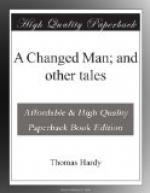April 20. Milan, 10.30 p.m.—We are thus far on our way homeward. I, being decidedly de trop, travel apart from the rest as much as I can. Having dined at the hotel here, I went out by myself; regardless of the proprieties, for I could not stay in. I walked at a leisurely pace along the Via Allesandro Manzoni till my eye was caught by the grand Galleria Vittorio Emanuele, and I entered under the high glass arcades till I reached the central octagon, where I sat down on one of a group of chairs placed there. Becoming accustomed to the stream of promenaders, I soon observed, seated on the chairs opposite, Caroline and Charles. This was the first occasion on which I had seen them en tete-a-tete since my conversation with him. She soon caught sight of me; averted her eyes; then, apparently abandoning herself to an impulse, she jumped up from her seat and came across to me. We had not spoken to each other since the meeting in Venice.
‘Alicia,’ she said, sitting down by my side, ’Charles asks me to forgive you, and I do forgive you.’
I pressed her hand, with tears in my eyes, and said, ’And do you forgive him?’
‘Yes,’ said she, shyly.
‘And what’s the result?’ said I.
‘We are to be married directly we reach home.’
This was almost the whole of our conversation; she walked home with me, Charles following a little way behind, though she kept turning her head, as if anxious that he should overtake us. ‘Honour and not love’ seemed to ring in my ears. So matters stand. Caroline is again happy.
April 25.—We have reached home, Charles with us. Events are now moving in silent speed, almost with velocity, indeed; and I sometimes feel oppressed by the strange and preternatural ease which seems to accompany their flow. Charles is staying at the neighbouring town; he is only waiting for the marriage licence; when obtained he is to come here, be quietly married to her, and carry her off. It is rather resignation than content which sits on his face; but he has not spoken a word more to me on the burning subject, or deviated one hair’s breadth from the course he laid down. They may be happy in time to come: I hope so. But I cannot shake off depression.
May 6.—Eve of the wedding. Caroline is serenely happy, though not blithe. But there is nothing to excite anxiety about her. I wish I could say the same of him. He comes and goes like a ghost, and yet nobody seems to observe this strangeness in his mien.
I could not help being here for the ceremony; but my absence would have resulted in less disquiet on his part, I believe. However, I may be wrong in attributing causes: my father simply says that Charles and Caroline have as good a chance of being happy as other people. Well, to-morrow settles all.
May 7.—They are married: we have just returned from church. Charles looked so pale this morning that my father asked him if he was ill. He said, ‘No: only a slight headache;’ and we started for the church.




